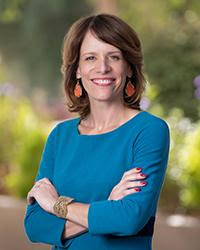Sara Gordon

What's the most important thing you are working on right now?
I think it’s safe to say that the most important thing I’ve worked on this year has been the law school’s transition to an entirely online curriculum – a move that took place virtually (pun intended) overnight. One day we started hearing about this very scary thing called Covid-19, and a few days later we were making sure faculty had the resources they needed to bring their courses entirely online, from their homes, during the middle of the semester. It has easily been the most challenging time of my career and I will be forever grateful to all of the faculty and staff who are helping to pull it off and to all of the students who have hung in there with us while we’ve all tried to make the best of an impossible situation.
What have you read, listened to, or watched recently that has influenced you or your work?
I had just started working on a new article right around the time I became Associate Dean a few years back. In a nutshell, the paper examines what I think of as “sticky myths,” and the reluctance of legal decision-makers to embrace challenges to their longstanding ideas or practices, even in the face of credible scientific evidence suggesting that the old approaches might be incorrect or misinformed. In particular, the paper examines the admission of forensic feature comparison methods in criminal trialsthese are the forensic methods that allow experts to match things like bitemarks or latent fingerprints to a criminal defendant. While these types of evidence are regularly admitted against defendants and most peopleincluding jurorsare convinced of their validity and reliability, the scientific community tells us something very different. Many of these forensic methods, like latent fingerprint analysis, have significantly higher error rates than we have always believed, while others, like bitemark evidence, have virtually no scientific validity and should not be admitted by courts. The paper focuses on this disconnect, and the resistance of juries and courts to believe new information that contradicts or disproves the things they have always assumed to be true.
Although writing has become slightly more challenging during my time as Associate Dean (during a pandemic), I recently found some new energy to return to the paper when I discovered the podcast, “You’re Wrong About,” in which the hosts “reconsider a person or event that's been miscast in the public imagination.” The podcast examines a wide spectrum of people and events from Tonya Harding to Kitty Genovese, and the “Satanic Panic” of the 1980s to the Jonestown Massacre. At its core, it’s a history podcast, but one that challenges our memories and misconceptions about famous people and events and attempts to recast some of the things we’ve internalized as “true.” I love to open my articles with stories about real people; it’s one of my favorite parts to research and write. Recent articles led with stories about Bill Wilson and Carrie Fisher and thanks to this podcast, I’m going to have a hard time choosing just one to open this new piece.